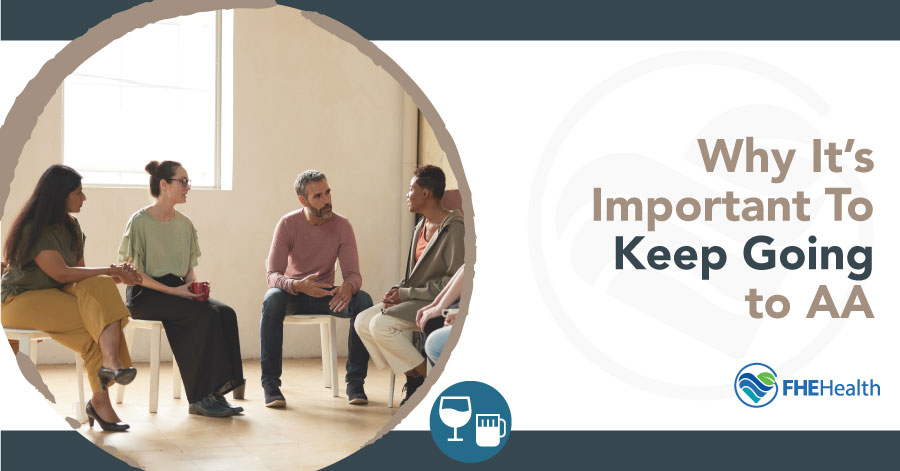
There are many sayings and motivational phrases used in Alcoholics Anonymous (AA) meetings. “One day at a time,” “Progress, not perfection” and the Serenity Prayer are a few commonalities most members going to AA can attest to hearing more than once. However, perhaps the most important and regularly uttered mantra of AA is “Keep coming back.”
There are several reasons this phrase has become such an integral part of many alcoholics’ recovery and helps them stay connected to the AA community wherever they are on that journey. Continuing to show up each day or week is necessary to overcome potential relapses. Since 90% of alcoholics are likely to relapse within the first four years of remission, a support system can improve your chances of continued sobriety.
What Is AA?
Alcoholics Anonymous, commonly referred to as AA, is a nonprofit organization that provides support to recovering alcoholics internationally. The goal of AA is to facilitate and encourage a recovery based on abstinence through periodic meetings with like-minded individuals.
AA operates on a 12-step program. These steps revolve around first admitting there’s a problem and accepting help. Participants then work through righting the wrongs against loved ones while drinking, taking responsibility for their actions and eventually carrying on the message to others through service.
Around 14.5 million people age 12+ have an alcohol use disorder of some sort in the United States. The prevalence of alcohol abuse emphasizes the need for effective treatment options.
AA members receive sobriety chips when they continue to attend meetings and successfully abstain from alcohol for specific periods. Common milestones for sobriety chips are 1 month, 3 months, 6 months, 9 months and 1 year.
Going to AA Meetings Is Essential to Recovery
Going to AA, regardless of how long you’ve been sober, is critical to managing alcoholism. A comprehensive analysis by the Stanford School of Medicine found that attending Alcoholics Anonymous is the most effective way to maintain alcohol abstinence. It evaluated 35 studies to determine that attendance at AA meetings could be more effective in maintaining sobriety than psychotherapy alone. The analysis also found AA attendance correlated with reduced health care costs.
According to Professor of Psychiatry and Behavioral Sciences Keith Humphreys, Ph.D., AA is more effective compared to other treatment methods because it’s based on building a sense of community. It’s possible for people to change their behavior in this setting because they’re surrounded by others on the same path with the same goals. Therefore, coming back to AA meetings throughout your life is important to maintaining your mental health as an alcoholic.
Should You Still Attend AA Meetings After Relapsing?
Yes, this is arguably the most critical time to “keep coming back,” even though it’s also the most challenging. Returning to AA meetings after relapsing can be difficult for several reasons; you may feel embarrassed or ashamed of your relapse and fear judgment from others. You may also not be in a place mentally where you feel like being sober again, depending on what events led to your relapse. Showing up for yourself and being honest about where you’re at is the first step toward earning that 1-month sobriety chip again.
What Are the Benefits of Committing to Continued AA Attendance?
One study published by the American Journal on Addictions followed an experiment of two groups of AA members. The first group completed the 12 steps, while the other group didn’t. The findings indicate that those who participated fully in the program and completed the steps had lower levels of social insecurity than those who attended meetings but didn’t complete the steps. However, both groups demonstrated the same level of social potency. This seems to suggest that regardless of how closely AA members are following the steps of the program, the social aspect of the meetings still benefits their recovery.
When people are told to “keep coming back,” this means they should show up to meetings whether they relapse or remain sober. Even while sober, attending AA meetings is critical to maintaining that stage of recovery. It provides a setting to surround yourself with other people who are sharing their stories and encouraging one another to stay the course.
Another part of the “keep coming back” mantra is to support others in the group. The sense of community in AA goes both ways, and while you benefit from the relationships you build with others, you can provide that support to someone else. When you’re leading a sober life that feels rewarding and comfortable, coming back to meetings means showing up for friends who are still struggling with relapses or offering words of encouragement to new members who are at their lowest point.
Attending AA even when sober and healthy is beneficial to the group as a whole because you become a beacon of hope to newcomers who see that it’s possible to turn their life around, too. This means showing up regularly, even on the days when you don’t feel like it or don’t think you need to. You might meet someone or learn something that changes your life for the better.
Professional Help Is Available To Support Your Recovery
If you keep coming back to AA and still feel like you require additional support in your recovery, professional services are available across the United States. At FHE Health, our compassionate team of counselors is standing by to take your call, 7 days a week, at (833) 596-3502.
Our team offers inpatient and outpatient addiction treatment services, including an inpatient detox program. This may be the best option for someone attempting to stop alcohol consumption if they’re highly addicted. Find out more about our programs and talk to one of our helpful staff members to take that first step.






